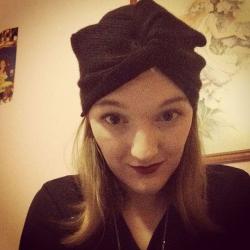Adelaide Festival: Windmill Trilogy set to blow audiences away
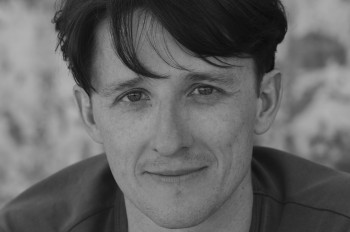
In amongst rehearsing his lead roles in Windmill Theatre’s upcoming festival trilogy and fulfilling his commitments as writer of all three featured shows, Matthew Whittet took time to speak to AussieTheatre’s Paige Mulholland about the shows, writing for young audiences, the metaphor of dystopia and the Adelaide Festival.
At the 2014 Adelaide Festival Windmill Theatre will be presenting three of its latest young adult projects, Fugitive, School Dance and Girl Asleep, in the Space Theatre.
Fugitive returns to Adelaide after its successful premiere run in 2010. The performance follows a modern-day Robin Hood in a dystopian world where authority has disintegrated leaving nothing but K-Marts and McDonalds in its wake. With its original cast and improved design and scripting Fugitive promises to meet, or even exceed, the expectations born of its critically-acclaimed first run and to excite audiences, old and new, with its high-energy plot.
“There’s something kind of furious and crazy [about Fugitive]. The first 15-20 minutes of … is pretty exhausting to perform, but also really exhilarating.” says Whittet.
The trilogy also includes 2012 Adelaide Festival hit School Dance, which follows a band of 1980’s misfits as they muddle their way through the often-painful ritual of the school social. With its quirky comedy and geeky protagonists the show is a far cry from Fugitive’s fast-paced action and confronting alternate reality.
Whittet feels that, in terms of main characters, School Dance is “all about the geeks. The opposite of Fugitive; not the alpha male, more the omega male.” he says with a laugh.
Rounding out the trilogy is the premiere of Whittet’s newest work Girl Asleep. It is the only work of the three to follow a female protagonist and, in Whittet’s opinion, is the most emotional. The protagonist is a girl who is paralysed with adolescent dread and angst in anticipation of her upcoming birthday party; hers is an angst that pulls her fragile psyche into a labyrinth that threatens to consume her.
“It has more of a beautiful quality to it, but at the same time kind of equally ridiculous and stupid as well.” explains Whittet.
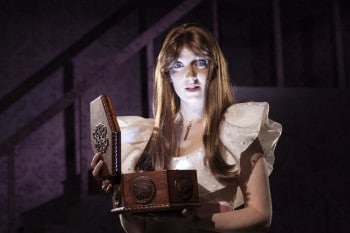
Photo by Shane Reid
At first glance there is very little to tie the three projects together as a trilogy; with such varying atmospheres, plots and genres, each show seems to be entirely in a league of its own. Whittet confesses that this is because, before the idea was suggested to them by Adelaide Festival representatives, linking the shows was not something he, or director Rosemary Myers, had considered.
“They’re three plays we started working on about four years ago which were never really meant originally to be a trilogy,” he says.
However both Myers and Whittet point to the common themes of adolescence, rites of passage and the challenges of approaching adulthood. Although each show is unique, they all explore different sides of the same coin, adds Whittet.
Another key aspect that ties the three pieces together is the cast and creative team, with many members ‘doubling up’ across shows within the trilogy. Two members of the design team, set designer Jonathon Oxlade and sound designer Luke Smiles, step into entirely new roles for School Dance, playing two of the main characters. Although these diverse roles are time-consuming and intensive Whittet believes that this cross-over of involvement is a real strength.
“Everyone gets to invest a lot more in what they’re doing and I feel like everyone gets to own the material and the process … In some ways it’s been a big challenge, but in others it’s made it really rewarding and really exciting.” says Whittet.
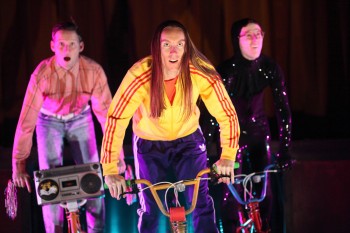
L-R: Jonathon Oxlade, Luke Smiles, Matthew Whittet
Photo: Tony Lewis.
The fact that the shows are all aimed at young adult audiences is another factor which binds the trilogy together. Although originally Windmill’s youth focus defined the angle for Whittet’s stories, he has fallen in love with writing for the young and the young at heart.
“I really love teenage audiences. I think they’re the most underrated audience out there. If you give them something they like, present them with something that was made for them and doesn’t feel like it’s talking down to them, they can be one of the most exciting and crazy audiences, because they just respond.” he enthuses.
“Teenagers these days have such amazing capacity to read cultural languages because there’s so much TV, there’s so much social media, there’s so much of everything that they filter every day …They have this capacity [to] … devour work really quickly. It means that we can play with how we tell our stories.”
When looking at the works that modern teenagers devour, dystopian pieces like Whittet’s Fugitive are clear frontrunners. Having loved dystopian stories during his own teenage years, he says that the theme is much more than just a trend.
“All those stories come from that single basic impulse, having to grow up, and it’s such a great metaphor for it that I think it’s going to be one of those tropes that’s going to go on for generations. It already has gone on for generations.” he says. “It’s just a metaphor for coming to the end of your teenage years and having to enter adulthood.”
“This notion inside a teenager is that all of a sudden the world becomes much harder, much harsher, and you have to stand as an individual. Especially if you look at things like The Hunger Games, it’s absolutely about that. And it’s absolutely about a young woman coming of age and trying to build a world for herself that she can grow into” he adds.
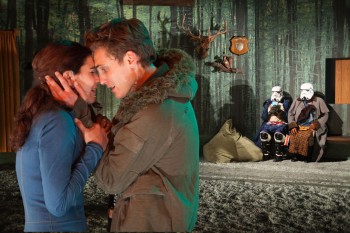
L-R: Danielle Catanzariti, Eamon Farren with stormtroopers (in background)
Photo: Tony Lewis
Fugitive, with its themes of anarchy, morality and justice, fits snugly within the dystopian genre, appealing easily to a generation of young people who cut their literary teeth on Suzanne Collins and glued their eyes to the cinema screen during V for Vendetta.
Although Whittet describes Fugitive as highly filmic, it’s Girl Asleep that’s about to get the big screen treatment, with plans to develop the play into a film later this year. The HIVE fund, initiated by the Adelaide Film Festival and the Australia Council for the Arts, will facilitate the production of Girl Asleep which will premiere at the 2015 Adelaide Film Festival.
Girl Asleep is the first film project to come from a Windmill production and the creative team are both excited and overwhelmed to be taking on such a large venture.
“That’s a very large bridge to cross!” says Whittet.
Of course, before the project comes to that bridge the team must focus on the upcoming Adelaide Festival run, where they will cater for a broad range of audiences from school groups to festival patrons.
“That cross section of audiences always feels the richest for us because it speaks to a whole lot of different levels. … the work isn’t necessarily just purely made for teenagers, it’s also made for older audiences that were teenagers at some point or another” explains Whittet.
“It’s very exciting to be doing the shows again. It’s so great that an Adelaide company gets to perform three original works that were all built, and made, and came out of Adelaide, in the Adelaide Festival.” Whittet says. “Adelaide during the festival is just cracker. It’s the best time.”

